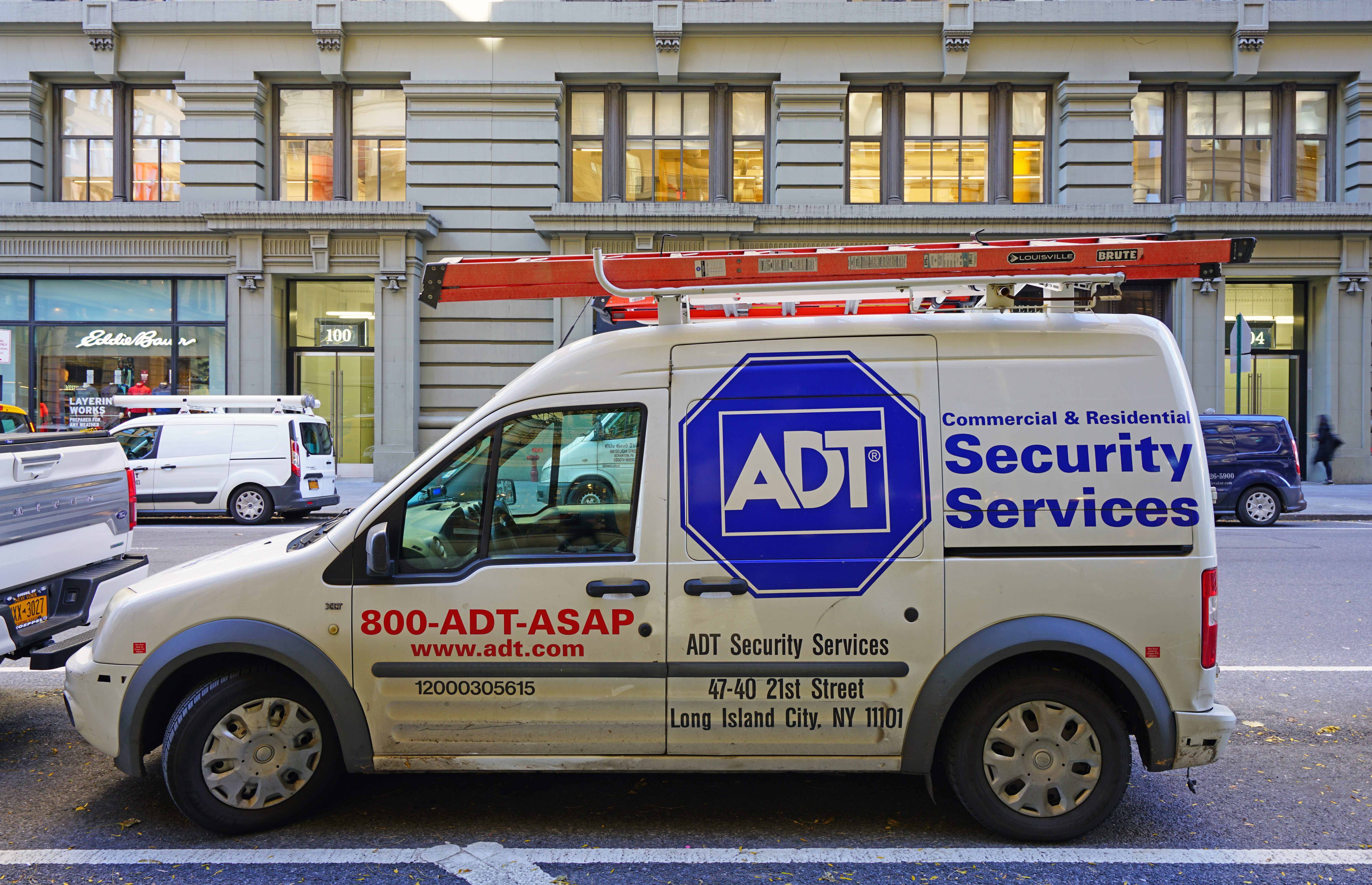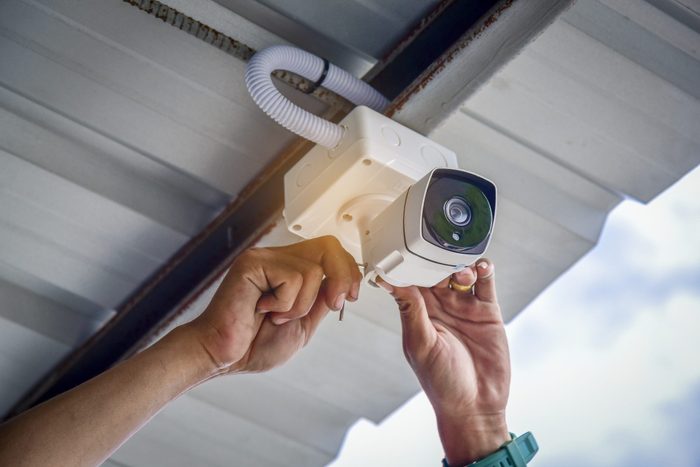
Buyers beware!
We all want to feel safe in our homes, which is why many of us think about investing in security systems in the first place. Unfortunately, it’s incredibly easy to fall victim to home security offers that are actually scams. From sketchy door-to-door salespeople to strange calls and rogue websites, here are the common scams you might encounter, the red flags to keep in mind, and what to do if you accidentally sign on the dotted line. Once you’re up to speed, read up on the 14 things security experts never do in their own homes.

Be wary of door-to-door salespeople
This is a good rule of thumb, in general. According to Robert Siciliano, a security expert for Porch.com, anyone claiming to be a “salesperson” at your door is probably a scammer. “At this point, anytime anyone knocks on your door, be suspect,” he says. Of course, many years ago, going door-to-door was a common way to sell everything from encyclopedias to vacuum cleaners and even security systems. But the Internet has made door-to-door sales almost completely obsolete, and most legitimate companies just do not sell their products this way.
Unfortunately, scams come in many forms—and in nearly every facet of life. If you’re thinking of remodeling, know these 11 trusted tips to avoid a home improvement scam.

Send away anyone who shows up unannounced
Ana Bera, the cofounder of Safe at Last, says that a representative who comes to your home without an appointment can be a sign of fraud. “Nobody wants to be unsafe in their own home. This fact is what frauds count on when they appear at people’s houses as representatives of certain security providers,” she explains. “However, they never have a scheduled appointment and tend to appear out of the blue. If this is the case, people should be extremely cautious, since none of the security companies randomly send representatives without first checking with the customers.” Of course, you don’t have to open your door to encounter a scammer. These 10 phone call scams could steal your money.

However, there are exceptions to every rule
There are still a few home security companies that employ door-to-door salespeople, including major players such as Vivint and ADT. So, how can you spot a fake? Vivint sales representatives will always be in uniform as well as have a photo ID and badge number that can be verified quickly on the company’s website. If you aren’t sure if a salesperson is an authorized representative of any company, ask to see a badge number and business card. Then call customer service, just to make sure they’re legitimate. If they are, they should have no problem sharing this information. To avoid salespeople altogether, opt for one of these best-reviewed security cameras and then install the camera yourself.

A legitimate sales rep won’t pressure you
Bera warns that scare tactics, such as creating a sense of urgency, are a go-to for scammers. “For instance, they may claim that there’s a high level of danger all of a sudden that needs to be addressed [right then],” she says. “Or they may try to push people into making a deal, without giving them enough time to think about the offer and decide on their own.” Someone who works for a credible security service provider would never treat potential customers this way. So, if that is happening, tell the person to leave, close your door, and lock it.

Avoid limited-time offers
Limited-time offers are a giant red flag that you are being scammed. Kimberly Alt of SafeSmartLiving notes that if a company truly wants your business, it won’t pressure you to sign a contract immediately. Waiting 24 hours for you to make the right decision regarding the best home security system for your specific needs shouldn’t be a problem. “Tell them you want to think on it and ask for their contact info, so you can research and follow up later,” says Alt. “If they are still continuing to pressure you, it’s best to walk away—literally, if it’s door-to-door salespeople.”

Use common sense
As the old saying goes, if it sounds too good to be true, it probably is. “Salespeople calling you out of the blue or knocking on your door offering a limited deal and pressuring you to buy immediately because of a flash sale or other major steal isn’t something you want to partake in,” says Alt. If a salesperson is making you feel uncomfortable, or you just don’t have a good feeling about them, trust your gut. There’s likely a reason that you feel this way.

Never accept free equipment
Everything comes at a price, and there’s no such thing as “free.” The Federal Trade Commission (FTC) warns that if a security salesperson offers you free equipment, it is best to decline it and shut your door. It’s very likely someone is trying to rip you off. Here’s the thing: While equipment such as alarms, sensors, and other devices may indeed be free, consumers end up being swindled into long-term, expensive monitoring contracts that usually end up costing way more than the actual equipment. So “free” ends up coming with a lot of strings (and dollar signs) attached. Here are another 10 sneaky “deals” that are actually money scams.

Beware of upgrade offers
You might think you’re safe if you already have a security system installed, but unfortunately, you’re still vulnerable to scams—just in a different way. In this scenario, according to the FTC, salespeople may come to your door, claiming they are from your existing security company and saying they need to replace or upgrade your current system. But once they get inside your home, they may install an entirely new system and require you to sign papers for a more expensive monthly contract. Instead of letting these people in and falling for their trap, contact your current provider for more information on any potential upgrades.

Don’t trust a sales rep who claims your current security provider has gone out of business
Warning! If a salesperson comes to your door and claims that your current provider has gone out of business or that they’ve “taken over the accounts,” don’t trust them. These scammers may ask you to buy new equipment and sign additional contracts, which means you’ll end up footing the bill for two systems.
Instead, suggests the FTC, call your provider for confirmation and additional info. That said, if a company is, in fact, going out of business, they will usually notify customers via email or telephone. If you’re also worried about online security, check out these 23 tips to prevent identity theft and other cyber-scams.

Do your research
The best thing you can do, according to experts, is to thoroughly research any home security company before signing a contract or paying for equipment. “The best way to become fully informed is to go to online resources that you know, like, and trust, such as review sites with in-depth commentary and research done by trusted authors and experts,” says Siciliano. Alt also recommends looking up any potential companies on the Better Business Bureau’s websites before signing any kind of contract. “[Check] your state’s consumer protection agency,” she says. “From there, be sure to check that they have a professional-looking website with privacy and return policies.”

Make sure the company has a legitimate website
If a website doesn’t look legitimate, it’s probably because the business isn’t. If you still aren’t sure, Gabe Turner, the director of content at Security Baron, has a few suggestions. “The website should accept normal payment methods, like credit and debit cards,” he says. “It’s a red flag if they only accept money transfers or wires [such as Western Union or Money Gram].” He also suggests checking out companies on social media and reviewing customer- and employee-review websites like Facebook and Glassdoor. Another way to get quick info on the legitimacy of a company is Yelp. Here are another 10 online scams you need to be aware of—and how to avoid them.

Read the fine print
One new home security scam involves giving consumers contracts to sign on tablets that don’t allow them to scroll through the terms they’re agreeing to, according to AZ Central. Yes, many reputable security companies will hand you an electronic contract on a tablet, laptop, or phone to sign—but as with anything else, it’s important to read the fine print. Get a paper copy of the contract so you can review it for yourself and make sure everything is 100 percent correct. Never sign anything you haven’t thoroughly read and truly understand.
Be aware of the FTC’s Cooling-Off Rule
What should you do if you sign a security contract and realize you’ve been scammed? Well, if you recognize it fast enough, you may be in luck. The FTC’s Cooling-Off Rule allows you to cancel door-to-door contracts within three business days of signing. Consumers must sign and date one copy of the cancellation form and then send it to the address on the contract. If you weren’t given a cancellation form, you’ll need to write a cancellation letter instead. Then, the business has 10 days to refund your money. If they don’t, consumers have the right to file a complaint with the FTC. Many people are simply unaware of this law. Don’t miss these 20 other secrets a home security installer won’t tell you.

